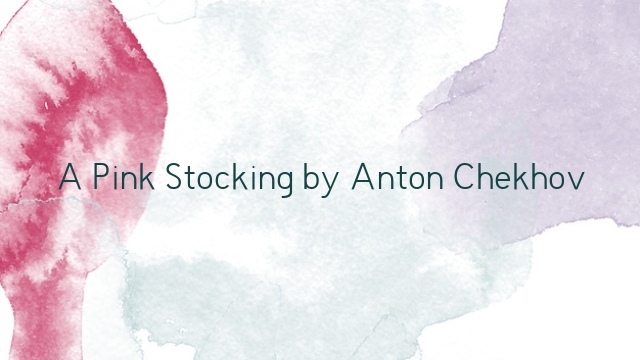
DULL, rainy day. The sky is completely covered with heavy clouds, and there is no prospect of the rain ceasing. Outside sleet, puddles, and drenched jackdaws. Indoors it is half dark, and so cold that one wants the stove heated.
Pavel Petrovitch Somov is pacing up and down his study, grumbling at the weather. The tears of rain on the windows and the darkness of the room make him depressed. He is insufferably bored and has nothing to do. . . . The newspapers have not been brought yet; shooting is out of the question, and it is not nearly dinner-time. . . .
Somov is not alone in his study. Madame Somov, a pretty little lady in a light blouse and pink stockings, is sitting at his writing table. She is eagerly scribbling a letter. Every time he passes her as he strides up and down, Ivan Petrovitch looks over her shoulder at what she is writing. He sees big sprawling letters, thin and narrow, with all sorts of tails and flourishes. There are numbers of blots, smears, and finger-marks. Madame Somov does not like ruled paper, and every line runs downhill with horrid wriggles as it reaches the margin. . . .
“Lidotchka, who is it you are writing such a lot to?” Somov inquires, seeing that his wife is just beginning to scribble the sixth page.
“To sister Varya.”
“Hm . . . it’s a long letter! I’m so bored — let me read it!”
“Here, you may read it, but there’s nothing interesting in it.”
Somov takes the written pages and, still pacing up and down, begins reading. Lidotchka leans her elbows on the back of her chair and watches the expression of his face. . . . After the first page his face lengthens and an expression of something almost like panic comes into it. . . . At the third page Somov frowns and scratches the back of his head. At the fourth he pauses, looks with a scared face at his wife, and seems to ponder. After thinking a little, he takes up the letter again with a sigh. . . . His face betrays perplexity and even alarm. . . .”
“Well, this is beyond anything!” he mutters, as he finishes reading the letter and flings the sheets on the table, “It’s positively incredible!”
“What’s the matter?” asks Lidotchka, flustered.
“What’s the matter! You’ve covered six pages, wasted a good two hours scribbling, and there’s nothing in it at all! If there were one tiny idea! One reads on and on, and one’s brain is as muddled as though one were deciphering the Chinese wriggles on tea chests! Ough!”
“Yes, that’s true, Vanya, . . .” says Lidotchka, reddening. “I wrote it carelessly. . . .”
“Queer sort of carelessness! In a careless letter there is some meaning and style — there is sense in it — while yours . . . excuse me, but I don’t know what to call it! It’s absolute twaddle! There are words and sentences, but not the slightest sense in them. Your whole letter is exactly like the conversation of two boys: ‘We had pancakes to-day! And we had a soldier come to see us!’ You say the same thing over and over again! You drag it out, repeat yourself. . . . The wretched ideas dance about like devils: there’s no making out where anything begins, where anything ends. . . . How can you write like that?”
“If I had been writing carefully,” Lidotchka says in self defence, “then there would not have been mistakes. . . .”
“Oh, I’m not talking about mistakes! The awful grammatical howlers! There’s not a line that’s not a personal insult to grammar! No stops nor commas — and the spelling . . . brrr! ‘Earth’ has an a in it!! And the writing! It’s desperate! I’m not joking, Lida. . . . I’m surprised and appalled at your letter. . . . You mustn’t be angry, darling, but, really, I had no idea you were such a duffer at grammar. . . . And yet you belong to a cultivated, well-educated circle: you are the wife of a University man, and the daughter of a general! Tell me, did you ever go to school?”
“What next! I finished at the Von Mebke’s boarding school. . . .”
Somov shrugs his shoulders and continues to pace up and down, sighing. Lidotchka, conscious of her ignorance and ashamed of it, sighs too and casts down her eyes. . . . Ten minutes pass in silence.
“You know, Lidotchka, it really is awful!” says Somov, suddenly halting in front of her and looking into her face with horror. “You are a mother . . . do you understand? A mother! How can you teach your children if you know nothing yourself? You have a good brain, but what’s the use of it if you have never mastered the very rudiments of knowledge? There — never mind about knowledge . . . the children will get that at school, but, you know, you are very shaky on the moral side too! You sometimes use such language that it makes my ears tingle!”
Somov shrugs his shoulders again, wraps himself in the folds of his dressing-gown and continues his pacing. . . . He feels vexed and injured, and at the same time sorry for Lidotchka, who does not protest, but merely blinks. . . . Both feel oppressed and miserable. . . . Absorbed in their woes, they do not notice how time is passing and the dinner hour is approaching.
Sitting down to dinner, Somov, who is fond of good eating and of eating in peace, drinks a large glass of vodka and begins talking about something else. Lidotchka listens and assents, but suddenly over the soup her eyes fill with tears and she begins whimpering.
“It’s all mother’s fault!” she says, wiping away her tears with her dinner napkin. “Everyone advised her to send me to the high school, and from the high school I should have been sure to go on to the University!”
“University . . . high school,” mutters Somov. “That’s running to extremes, my girl! What’s the good of being a blue stocking! A blue stocking is the very deuce! Neither man nor woman, but just something midway: neither one thing nor another. . . I hate blue stockings! I would never have married a learned woman. . . .”
“There’s no making you out . . .,” says Lidotchka. “You are angry because I am not learned, and at the same time you hate learned women; you are annoyed because I have no ideas in my letter, and yet you yourself are opposed to my studying. . . .”
“You do catch me up at a word, my dear,” yawns Somov, pouring out a second glass of vodka in his boredom.
Under the influence of vodka and a good dinner, Somov grows more good-humoured, lively, and soft. . . . He watches his pretty wife making the salad with an anxious face and a rush of affection for her, of indulgence and forgiveness comes over him.
“It was stupid of me to depress her, poor girl . . . ,” he thought. “Why did I say such a lot of dreadful things? She is silly, that’s true, uncivilised and narrow; but . . . there are two sides to the question, and audiatur et altera pars. . . . Perhaps people are perfectly right when they say that woman’s shallowness rests on her very vocation. Granted that it is her vocation to love her husband, to bear children, and to mix salad, what the devil does she want with learning? No, indeed!”
At that point he remembers that learned women are usually tedious, that they are exacting, strict, and unyielding; and, on the other hand, how easy it is to get on with silly Lidotchka, who never pokes her nose into anything, does not understand so much, and never obtrudes her criticism. There is peace and comfort with Lidotchka, and no risk of being interfered with.
“Confound them, those clever and learned women! It’s better and easier to live with simple ones,” he thinks, as he takes a plate of chicken from Lidotchka.
He recollects that a civilised man sometimes feels a desire to talk and share his thoughts with a clever and well-educated woman. “What of it?” thinks Somov. “If I want to talk of intellectual subjects, I’ll go to Natalya Andreyevna . . . or to Marya Frantsovna. . . . It’s very simple! But no, I shan’t go. One can discuss intellectual subjects with men,” he finally decides.





